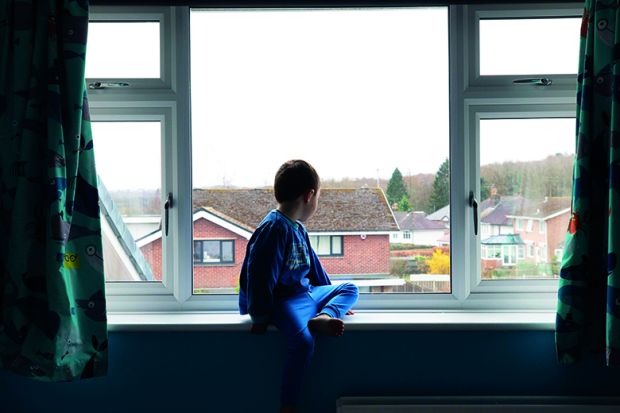Building an imaginary volcano from wooden blocks is not the kind of activity you normally observe when you visit a university. But this is a group of two- to five-year-olds at play in an unusual nursery in the midst of suburban estates in Shirecliffe, Sheffield, a hilly 15-minute drive north-east of the city centre.
The nursery is housed in part of a community centre, in what used to be a centre for Sure Start, the national programme to improve early years health and education for children in deprived areas. But that Sure Start centre has closed, along with others; one 2018 study suggested that as many as 1,000 of the centres might have closed over the previous nine years amid deep cuts in government funding for local authorities.
However, in April this year, a new Early Years Community Research Centre (EYCRC) opened in the Shirecliffe building, offering up to 40 nursery places and aiming for a Sure Start-like “early intervention” approach that works with whole families. The EYCRC is a partnership between Sheffield Hallam University’s South Yorkshire Futures programme, neighbouring Watercliffe Meadow primary school, Save the Children UK and Sheffield City Council.
THE Campus resource: Promoting community and inclusiveness to diverse and dispersed students
There are huge benefits to “getting in early with our families” as well as to giving children “quality provision before they start school”, said Ian Read, Watercliffe Meadow’s headteacher, in an area where the “level of social deprivation” means children start school with lower levels of “basic social communication”, problems that have “worsened as a result of the pandemic”.
That wider South Yorkshire Futures programme, of which the nursery is part, is Sheffield Hallam’s effort to boost the “educational attainment and well-being of learners” by working with schools and the four local authorities – Barnsley, Doncaster, Rotherham and Sheffield – across a region hit hard by huge job losses in mining and steel over past decades.
In reaching neglected suburbs and towns, South Yorkshire Futures could be a model for other universities seeking to find new regional roles in a fast-changing political and policy context. The Conservative government’s commitment to “levelling up” in the UK regions, to be further detailed in an imminent White Paper, alongside a 2019 Tory manifesto pledge to “strengthen universities and colleges’ civic role”, will bring increasing expectations for universities to not just improve education and thus economies in their regions, but do so in struggling deindustrialised, rural, suburban or coastal areas far removed from bustling campuses.
South Yorkshire Futures began in 2017, initiated at the encouragement of Jonathan Slater, then permanent secretary at the Department for Education, who had been impressed by the university’s education work in the region and suggested that it be brought together under a single banner.
That so many of Sheffield Hallam’s students come from South Yorkshire – about 40 per cent of the university's 30,000 students are from within 25 miles of its campus – and go into jobs in the region means that “our future and the region’s future are very tied together”, said Richard Calvert, deputy vice-chancellor (strategy and operations), formerly director general for strategy and resources at the DfE.

With South Yorkshire Futures, whether the young people from early years to 18 reached by the programme then go on to attend Sheffield Hallam “is not really the driver”, Mr Calvert said. “It’s about saying we’re committed to the long-term educational progress of children growing up in South Yorkshire.”
One element of South Yorkshire Futures is the Grow mentoring programme, launched in July 2020 in a bid to use the university’s resources to help school pupils across the region struggling with the legacy of lockdowns, an idea instigated by the Northern Powerhouse Partnership.
The scheme takes a different approach from the government’s subject-based National Tutoring Programme, avoiding the language of “catch up”, instead focusing on “helping pupils back into school, giving them space to talk about what happened to them in lockdown” and “being really positive about their future”, said Sue O’Brien, Grow programme lead and a strategic lead for South Yorkshire Futures.
With graduates facing a particularly tough employment market during the pandemic, the programme has employed and trained Sheffield Hallam and University of Sheffield graduates to be mentors, giving pupils on the programme a “relatable” adult closer to them in age than teachers or parents.
Mentors explain to students that they have been chosen because “your teachers think that with just a little bit more guidance, you could achieve that goal you’re wanting to get to: whether it’s going to university, getting an apprenticeship, going to college, whatever it is”, said Oliver Bartlett, a mentor and Sheffield Hallam teaching graduate.
Grow mentored 1,000 pupils last year, is doing so with the same number this year, plus recently won £500,000 funding to reach a further 1,400 GCSE and A-level pupils this year after a successful bid to the government’s UK Community Renewal Fund with Sheffield City Council and Barnsley Council. The latter provided funding for all its schools and colleges to take part between January and the summer.
“The feedback from students was off the charts,” said Karen Anderson, learning gain manager at Barnsley College. It has benefited students “especially if they’ve had a difficult time at school, especially if they haven’t got the role models in the family that others may have, if they haven’t got that cultural capital that opens up doors for them”, she added.
Across South Yorkshire Futures generally, the university has “found we could play a convening role…which no one else was playing”, said Mr Calvert. This is a region with four “strong and very proud and independent local authority areas”, he noted.
Whereas an individual local authority or school multi-academy trust might be perceived as having its own agenda if it tried to convene a project, the university “can be quite impartial”, said Ms O’Brien. “We’re not political. We can bring people together to face some of the challenges, but we’re not doing it for us.”
That role for the university is seen in another South Yorkshire Futures project, on early outcomes, which has brought together the region’s four local authorities to create a regional speech, language, communications and skills strategy, winning £1 million funding from the DfE to address early years development levels that are below national average.
After a survey of early years professionals in the region, a skills strategy was developed to tackle their low confidence levels in particular areas of dealing with speech and language delay, and each local authority is delivering training. There is also a website giving parents and carers information to support their own children with speech, language and communication and help ensure that they start school ready to thrive.
“The best thing for us is that the university has been central,” said Paula Williams, service leader for early years and childcare quality, inclusion and workforce development at Rotherham Metropolitan Borough Council. That has been crucial to bringing together four councils with their own ways of working, and also in “the skills that we’ve learned from university…from the academic side”, she added.
The university can bring skills in data analysis, for example, said Adam Leach, senior specialist manager at South Yorkshire Futures. And bringing councils together helps cut waste by avoiding “lots of people going off and trying to tackle the same problem in lots of different ways across a small region”, instead helping to pool resources “and work on it together in a much more efficient way”, he added.
At the EYCRC in Shirecliffe, Sheffield Hallam researchers will evaluate the impact of early intervention for children by following their progress in school, while it will also provide ongoing training for early year practitioners and health visitors on university courses.
And it will benefit Shirecliffe’s community by working in tandem with the neighbouring school’s ethos that the “earlier we can make contact with families, build relationships and support them, the greater the impact on the outcomes”, said Sally Pearse, Sheffield Hallam’s strategic lead for early years in South Yorkshire Futures and interim director of the EYCRC. That early childcare from age two onwards will allow parents to work more easily, while providing childcare throughout the holidays is also key when some families have been put under even greater stress by the pandemic, she added.
South Yorkshire Futures generally sees Sheffield Hallam taking on a new role “partly as a result of under-resourcing of local authorities and other bodies that maybe would have had that role previously”, but also because of “a real fracturing” of the schools system in a “more competitive” landscape of academy trusts and free schools, said Samantha Twiselton, director of the university’s Sheffield Institute of Education.
Across UK higher education and the English sector in particular, many older universities that do little regional student recruitment, that see themselves as competing in national and international markets in admissions and research, may see little of value for their own institutions in such civic work – perhaps even a dilution of precious prestige. And both pre- and post-92s may struggle to see a role for themselves in schools that is not about access to their own institution, to see a role beyond that from the early years onwards.
The drivers of higher education systems in research and teaching funding may have to change to herald any widespread changes of mission across all kinds of university – whether the Westminster government’s levelling-up White Paper provides new funding mechanisms in which universities might take part remains to be seen.
In light of South Yorkshire Futures’ impact, Sheffield Hallam’s ultimate aim is to “see whether we can develop a longer-term agenda with government and with the elected authorities in the region to really put our support and our role into a more long-term strategic approach”, said Mr Calvert.
In a fractured and under-funded local government and school landscape, where the government simultaneously seeks levelling-up in struggling areas, Sheffield Hallam’s work on South Yorkshire Futures shows how a new role for universities may be opening up – and may be required in many other areas across the country – in uniting schools and councils behind “place-based” ideas to raise educational attainment from the early years onwards.
POSTSCRIPT:
Print headline: University provides timely early lessons in ‘levelling up’
Register to continue
Why register?
- Registration is free and only takes a moment
- Once registered, you can read 3 articles a month
- Sign up for our newsletter
Subscribe
Or subscribe for unlimited access to:
- Unlimited access to news, views, insights & reviews
- Digital editions
- Digital access to THE’s university and college rankings analysis
Already registered or a current subscriber? Login









